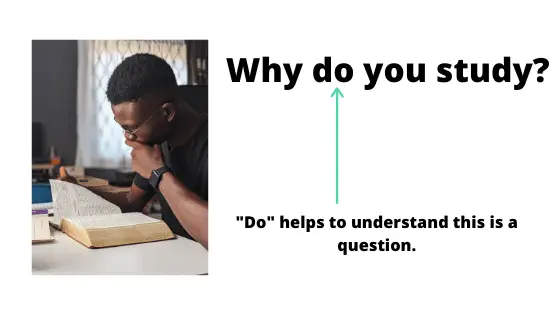An auxiliary verb is also known as a helping verb. This means that the auxiliary verb helps the main verb so we can write in different tenses, moods, and voices.
Example: I have been to Brazil.
In this example, “Have” is the auxiliary verb and “been” is the main verb. It is important to understand that the auxiliary verb doesn’t mean anything but helps the verb “to be”. Have shows that this is the present perfect tense.

How and when do you use auxiliary verbs?
We use different auxiliary verbs to help main verbs and give them more meaning. For example, we can use “do” to help us understand that a sentence is a question or a negative.
Let’s look at some of the most common auxiliary verbs Be, Do and Have
Be as an auxiliary verb
We use the verb “To be” as an auxiliary in two situations:
For continuous verb tenses
Present continuous: You are reading an article about auxiliary verbs.
Past continuous: You were living in France.
In the first example the word “are” shows that the action is happening now. In this way, it gives more meaning to the action of the main verb “to read”
For forming the passive voice
Past simple: The man was arrested
The verb to be is added to every main verb to form the passive voice. I wrote an article about it here and you can also find examples of the passive voice in all verb tenses!
As you can see, the auxiliary verb “to be” helps us to understand if something is in the passive voice or if it is a progressive/continuous verb tense.
Do as an auxiliary verb
Do is one of the most common auxiliary verbs in English and it can be difficult for students because you often do not use this in your own language. We use do/does to make a question or a negative except with be, will and modal verbs.
For questions:
Do you like Chocolate?
Does your friend like Maths?
Where did you go last night?
For Negative sentences:
I don’t like pizza.
I didn’t watch the match.
In these examples, you can see that it is easier to understand that these sentences are not positive sentences. In other languages, we often use intonation to show that a sentence is a question.
Have as an auxiliary verb
Have usually means possession. I have a car.
But, when we use “have” as an auxiliary, then it shows that we are using a perfect tense
For Perfect tenses
Examples:
Present perfect simple: I have seen that movie.
Present perfect continuous: I have been going to the gym a lot recently.
Past perfect simple: I had saved money for years before I went to college.
Past perfect continuous: I had been running all morning and that was the reason I was tired.
You can see that in the present perfect continuous, we need the auxiliaries to be and to have and the main verb is “to go”. This is because we use have (to show a perfect tense) and be (to show a continuous tense)
Compare the present perfect simple and the present perfect continuous.
Be, do and have as main verbs
Remember that these verbs are also main verbs in sentences. Try to pay attention to when we use them as an auxiliary and when we use them as a main verb.
Be, do and have as main verbs and auxiliary verbs.
Sometimes we use these verbs as main verbs and auxiliary verbs which can seem confusing but if you understand how they work as auxiliaries then you should understand.
Examples:
Have you had your dinner yet?
Were you being sarcastic?

Is the verb “will” an auxiliary verb?
Yes, Will is an auxiliary verb because it helps us to know that a main verb is in the future tense. In fact, “Will” can only be used as an auxiliary verb and is never a main verb.
I will meet you there.
Will you buy some milk for me?
Are auxiliary verbs and modal verbs the same?
Modal verbs also change the meaning of the main verbs. They are auxiliary verbs. The difference is that modal verbs only change how probable some action is (should, could, need)
Auxiliary verbs are a much bigger group of verbs which include be, do and have.
We use Auxiliary verbs with so and neither
We also use auxiliary verbs with so and neither when we respond to someone
Examples:
“I like guitars.” “So do I”
“I didn’t like the movie.”
“Neither did I”
23 Auxiliary Verbs Complete List
This is the complete list of auxiliary verbs in English.
BE verbs: is, are, am, was, were
HAVE verbs: have, has, had
DO verbs: do, does, did
MODAL Verbs: will, would, shall, should, may, might, can, could, must, need, dare and ought to!
- “How Was Your Weekend?” Alternative Ways to Improve Your Conversations - February 19, 2024
- On Monday or Monday? What’s the Difference? - December 1, 2023
- 20 Alternative Ways to say “Thanks for the Heads Up”(+ Meaning) - November 30, 2023

